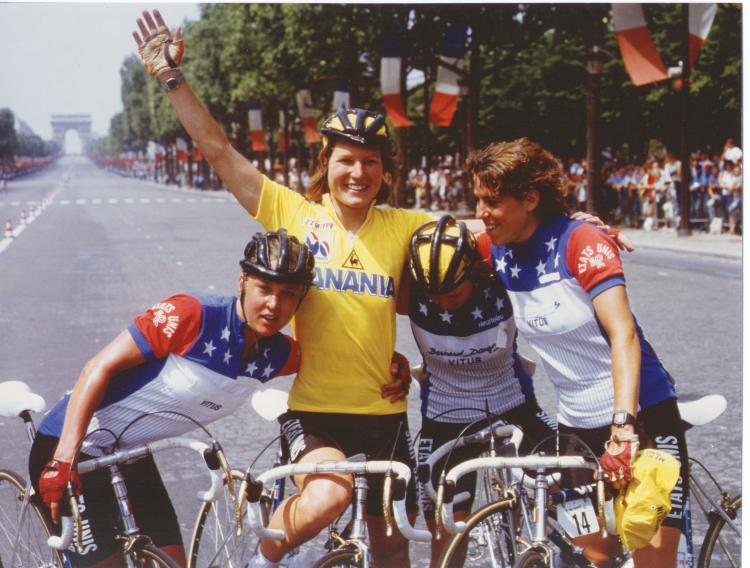
CU Alum is the First American To Win the Tour de France

Marianne Martin, second from left, in 1984.
Greg LeMond is credited as the first American winner of the Tour de France in 1986. But two years prior, 26-year-old Boulder cyclist Marianne Martin (Rec’80) claimed the coveted “le maillot jaune” — yellow jersey — as winner of the inaugural 1984 Tour de France Féminin. The race, which ran for five years before being discontinued, closely mirrored the men’s race: The women completed 18 stages in about 22 days along the same course as the men. (In modern equivalents, women bike racers now complete nine stages in about nine days.)
In October 2024, Martin suffered serious injuries in a road bike crash — but after extensive rehabilitation, is back riding.
How did you start racing?
I grew up dancing in Fenton, Michigan, but phased out of it during college. So I found other ways to stay fit, like trail running and cycling. I started riding with friends around 1980 who encouraged me to race. I finished fourth in my first one and started winning after that. Others asked me to join their team, and what I heard was ‘barbecues’ and ‘parties.’ I only cared about socializing.
What fueled your rapid rise to elite racing by 1983?
Once you win and feel that power in your body, it’s addictive. I never consciously said to myself, ‘I’m going to do this seriously.’ It just kind of came together. I was training consistently, and I had a solid network of friends and cyclists like Joy Yule, who took me under her wing. I didn’t do it all on my own.
Did your parents encourage your cycling career?
My dad didn’t at first. But my mom supported any crazy idea, even when I told her I wanted to be among the first women to ride in the Tour. She said, ‘Honey, that’s great!’
Any training secrets?
I met Tim Kelly, who helped boost my mental game with visualization, a new concept back then. And training with Andy Pruitt, a sports medicine pioneer whose philosophies were simple yet effective: Ride with a purpose — no wasted miles! — and rest, which I did way more than my competitors. That was also key to coming back from severe anemia throughout early 1984.
What got you on the U.S. team?
In June, just weeks before the Tour, I felt strong enough to race again. I knew one team spot was still open. When I told my friend Steve Tilford, a champion cyclist who knew cycling coach ‘Eddie B’ Borysewicz, he said, ‘We’re driving to Colorado Springs!’ He drove me to the Olympic Training Center the next day, and I managed to snag the spot. I promised Eddie, ‘You won’t be disappointed.’
How did you tune out critics (highlighted in the 2023 documentary Uphill Climb)?
Sure, we had people telling us we couldn’t finish the race. But I was just happy to be in France and compete. I didn’t care about going into debt to do it because I’d have my whole life to pay off my credit card. I just did it for the pure love of the sport.
What helped you win?
The French didn’t think we as women could finish, so that was my only goal. And when we reached the French Alps, my strength surprised me. I thought about riding with Steve back home while I recovered from anemia, how he’d teased me about my poor climbing skills. But they were my superpower, and I wanted that polka-dot jersey (awarded to the mountain-classifications leader). ‘I’ll show him!’ I joked to myself. After summiting 10 minutes ahead of the next riders, it finally registered that I could actually win this thing. It still reminds me that we can do so much more than we think.
What was it like to see your dad at the finish line?
As I came down the Champs-Élysées, I heard someone call my name. My father had flown over to surprise me! I grew up in a small town and was always known as ‘Dr. Martin’s daughter.’ After I won the Tour, he was suddenly ‘Marianne Martin’s dad!’
It’s been nearly a year since your bike accident in Sunshine Canyon, which included several days in the ICU. How are you?
Recovery has been both good and challenging. The surgeon did a remarkable job putting me back together. I don’t rebound as quickly as I used to, and can’t push myself too much yet, so it’s a great lesson in patience. At least I can get out and ride.
How did it feel to be inducted into the U.S. Bicycling Hall of Fame in 2021?
It was a huge honor, and I’m proud of my win. But it’s something I did — not who I am.
Photo by Graham Watson

